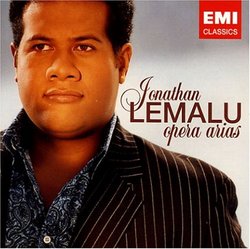A Young Bass-Baritone of Great Promise
Grady Harp | Los Angeles, CA United States | 07/20/2005
(4 out of 5 stars)
"While the lines of young and exciting sopranos, mezzo-sopranos, tenors, and countertenors even are gratefully long, the number of new bass-baritones is not as hefty (no pun intended). Yes, we gratefully have the brilliant Nathan Gunn, Rodney Gilfry, etc but there is definitely room for more. Enter Jonathan Lemalu who even though he is still in his twenties has sufficient vocal and stage presence to almost guarantee a long and successful career.
Now, whether that sort of interest in a newcomer justifies a recording of the breadth of this one, is in question. Not everything Lemalu sings is right for him though he does offer thirteen arias by Mozart (mainly), Boito, Gounod, Tchaikovsky, Rossini, Verdi and Wagner and not the 'safe' songs either. In the lighter buffo roles he is a joy, a singer with style and magical vocal presence that forgives the learning curve of technical flaws that are easily reparable. His is a wide-open voice that ascends the scale with ease (even if it doesn't descend to as low a register that promises bass roles). He moves from language to language with relative ease and from stylistic forms with more success in the Mozart/Rossini arena than the darker ones of Gounod and Boito.
Still, this is a voice that commands attention and one has the feeling that the legatos and the depth of tone will follow with some fine coaching. As for now, singing this recital at this stage takes courage and that is the kind of vigor that the opera stage can welcome. Oh yes, and like Kiri te Kanawa he is a New Zealander! The orchestra from his home accompanies without intrusion under the non-interfering (and mildly non-supportive) baton of James Judd. Grady Harp, July 05"
Kiwi Bass-Baritone Exhibits Powerful Talent in Diverse Set
Ed Uyeshima | San Francisco, CA USA | 05/22/2005
(4 out of 5 stars)
"No one can claim New Zealand-born Samoan bass-baritone Jonathan Lemalu of being too reticent. With his ebullient personality, he tackles a wide-ranging repertoire here that is all the more impressive for a relative newcomer only in his mid-twenties. While his youthful, precocious vigor at times belies the weight of some of the material, Lemalu has a powerful chest voice and exhibits a surprisingly assured technique that brings much more variety than I would have expected from his vocal range.
He certainly has a strong affinity with Mozart as his music constitutes nearly half the program. Lemalu gracefully portrays the love-searching bird-catcher Papageno from "Die Zauberflöte" with two of his comical arias, the merry introduction "Der Vogelfänger" and the ode to unrequited love, "Ein Mädchen oder Weibchen". He is equally at home singing Leporello's challenging catalogue aria from "Don Giovanni". But his Mozart highpoint has to be his troika of roles from "La Nozze di Figaro (The Marriage of Figaro)" in which he dexterously tackles arias by all three of the work's low male voices: Figaro, Dr Bartolo and Count Almaviva. The best is the latter's wrathful tirade at Susanna and Figaro, "Hai già vinta la causa!...Vedrò, mentr'io sospiro". Comedy characterizations appear to be Lemalu's strong suit. Listen to his confidently accelerated passages hitting each staccato note with glee as the pompous Dr. Bartolo spewing venom at Rosina in the comic aria, "A un dottor della mia sorte" from Rossini's "Il barbiere di Siviglia (The Barber of Seville)", or how Lemalu conveys the girth and bravado of Falstaff as he belittles the concept of honor in "Ehi! Paggio!...L'onore! Ladri" from Verdi's "Falstaff".
At the same time, the singer appears adept at roles requiring a high sense of drama, roles he apparently has yet to tackle on the stage, such as Prince Gremin's aria from Tchaikovsky's "Eugene Onegin" in which he sounds like a mournful foghorn at the end. Or the two arias where he plays the sinister Mephistopheles, the first is the moonlight serenade mocking Marguerite, "Vous qui faites l'endormie", from Gounod's "Faust", and the second right afterward as Lemalu captures the same character's melodrama confronting Faust complete with devilish whistles in Boito's "Mefistofele". He concludes the program as the condemned Dutchman mourning his plight on "Die Frist ist um" from Wagner's "Der fliegende Holländer (The Flying Dutchman)". I can only imagine what he will be able to do with these heavier roles once he is required to unearth the vocal nuances within a full-fledged production. The recording took place in New Zealand's capital Wellington, where Lemalu is accompanied by the full-sounding playing of New Zealand Symphony Orchestra, under the expert baton of conductor James Judd. Lemalu may look like a professional wrestler, but his impressive set indicates a bright future and an amazing talent to watch."


 Track Listings (13) - Disc #1
Track Listings (13) - Disc #1